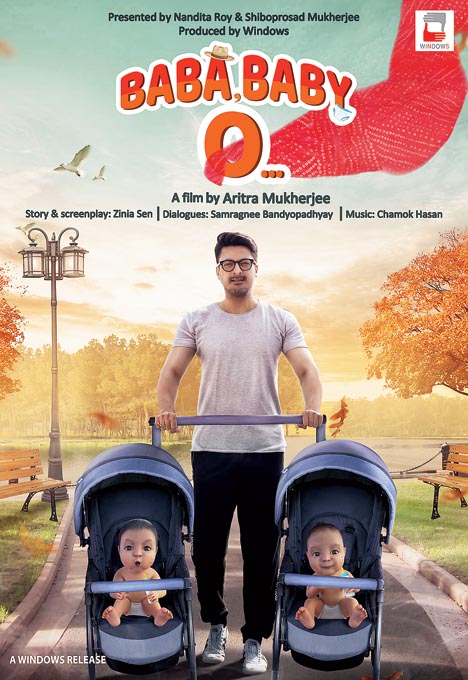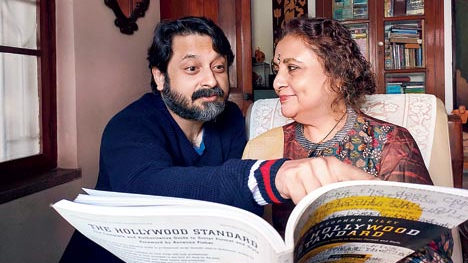The pandemic triggered a lot of uncertainties. When did you decide to get back to work, shooting ads with Sourav Ganguly, Abir Chatterjee and doing a television show? How was the experience?
I first heard about the pandemic around the second week of March when the workshop for Haami 2 was already on. Reports started pouring in from different parts of the world. Long before the pandemic, we had started the television show. It was locked in January and the shoot began in February. The show is a collaboration with the Adani Group and Star Jalsa. We had done many non-fiction shows before and after a hiatus we are back on television, but taking it slow and easy. About the ad with Sourav Ganguly, it was again locked before the pandemic. The shoot was supposed to happen on March 26, but it eventually got pushed back.
In showbiz, one good work leads to another. Soon after the Sourav ad, we got a call from Strategy Advertising for an ad with Abir. Then, there was one in which I featured as Laltu, my character from Ramdhanu and Haami. Then another ad with Abir followed. So, most of these projects had nothing to do with the pandemic, but yes, we got more time to pull them off, as our releases got pushed back. I think ours was the first ad that was shot after the lockdown and it had none other than Sourav. Shooting after the lockdown was a completely new experience, there was fear all around. We made it compulsory for everyone to wear masks at all times and we also had people sanitising the shooting locations every two hours. I was concerned about the safety of my team members.
What can we expect from Windows in 2021?
A big announcement to start the year! And followed by some really good films. Our film, Lokkhichhele, directed by Kaushik Ganguly and starring his son, Ujaan, will release in March. It’s an intense drama that will keep the audience on the edge all through. According to me, it’s Kaushikda’s best film till date. Lokkhichhele will release on Women’s Day in March as the story revolves around a girl child.
After that, we have the much-awaited Bela Shuru, slated to release in summer. It is our last film with Soumitrada (Chatterjee). In March last year, we had organised a screening for him and Swatilekhadi (Sengupta), along with the real-life couple who inspired this story — Pabitra Chitto Nandi and Geeta Nandi. But the screening got cancelled owing to the lockdown. Didi (Nandita Roy) and I will now have to live with this regret that we could not show the film to either Soumitrada or Pabitrada, as both passed away. Both were very keen to watch the film. Then, Aritra Mukherjee will start shooting Baba, Baby O in March. We have a release date in mind, but we have not locked it yet.
Then, there’s Haami 2. We have releases lined up for both Durga Puja and Christmas. So, we are looking forward to a happening year. We also have shows lined up for television. Also, our Hindi projects will start rolling this year.
How did the idea for the storyline of Baba, Baby O, that has Jisshu Sengupta playing a single parent, come about?
During the lockdown, one of our close relatives became a father of twin boys through surrogacy. The children were born in Mumbai, a day before Cyclone Amphan. They came in a neo-natal ambulance all the way from Mumbai. The kids have brought immense joy to the family. Since then, Zinia, my wife, has been spending most of her time with the kids. She told me about a complicated situation one day — what if a man who has embraced fatherhood through surrogacy, falls in love…. We were crossing the Lake Gardens flyover and I was immediately sold on the story. I asked her to write the story and narrate it to Didi. Didi liked the story so much that she said, ‘Let’s do this immediately’. Back then, they were working on Fatafati.

A poster of Baba, Baby O. Windows
Why cast Jisshu?
It’s a tailor-made role for Jisshu. When the team asked Didi about the possible choice of actors, she said it has to be Jisshu. I have known Jisshu as a responsible father and he also has the face of a lover boy. We have a two-film deal with him; this is the first. Also, he is a thorough professional and we had a great time directing him in Posto.
Would you like to premiere a Windows film on television?
No. I have a reason for that. We have always had a great connect with the audience, who has made us what we are today. Films are a way of reaching out to them on a one-on-one basis — we meet them, talk to them, and those interactions drive us to do better work.
A Windows film is for the entire family... family members go in large numbers to watch the films in halls. But things are different now. The elderly are not going to the halls and many are hesitant. In this scenario, what are your plans of releasing the films?
We’ll release the films in theatres, despite the turnout. We don’t want to deprive those who are making all the efforts to come to theatres. We need to encourage them. The rest can watch the films in others mediums after the release.
And going forward, will this make you think differently about the content that you produce in future?
We always try to think differently when it comes to content. There will be films with big stars and also with newcomers. The films will have to be good to draw the crowds. I will wait for the day when there’s no blocked middle seat anymore, as that drives away couples and also the family audience. Right now, it is an individual viewing at the theatres.
Brahma Janen Gopon Kommoti has been selected for the Indian Panorama section of International Film Festival of India (IFFI), Goa...
Not only is Brahma Janen Gopon Kommoti a part of the Indian Panorama, it has been selected to compete in the ‘Best Debut Film of a Director’ category at International Film Festival of India (IFFI), Goa. That’s a rare honour as very few Indian films are selected each year for competition with international films. This is the first time that a Windows film has made the cut and both Didi and I are jubilant. The film has a young team, the director (Aritra) is new, the writer (Zinia) is new, it’s the dialogue writer’s (Samragnee Bandopadhyay) second film. It’s Ritabhari Chakraborty and Soham Majumdar’s first as a film’s lead. The film was successful at the box office and with this selection, it completed a full circle.
What were the lessons learnt in 2020?
The most important lesson was to be with my family. Only in times of crisis do you really understand the value of people. I would do little things at home like making rotis and be of help to the rest. It also made me understand the value of things and how one could survive with basic stuff. The year 2020 made work from home the new way of living. Didi and I would run our office sitting at home and we honed new skills. Life is very unpredictable and I realised the importance of setting small goals. The idea was to achieve them and set newer ones.
And to sum up, how was the year 2020 for Windows?
Creatively, we did a lot. We returned on television with a non-fiction show and also shot many commercials. During the lockdown, there was not one free day as we came up with Lockdown Shorts at a time when there were not many other avenues of entertainment for the audience. Then, we had given a platform to the young brigade and they brought us laurels with both housefull shows and the IFFI selection. Also, we ventured into the web platform with a series.
While work kept us busy, we lost a lot of near and dear ones. Losing Soumitrada was like losing my father all over again. Then, we were almost ready to start our Hindi venture with Rishiji (Kapoor) and his going was a big blow. Writer Subrata Mukherjee was very close to us and we lost him too. We have the rights to his novel, Rashik. Then we lost people like actor Tapas Paul, production manager Bablu Halder, director Debidas Bhattacharya, director Sanjib Dey, actor-director Jagannath Guha, Star Theatre’s manager, Ranjan Ganguly, who were all close associates. Ranjan’s death shook me up completely, as he died of a cardiac arrest at his workplace. He, for me, is a representation of the single-screen theatre and his death made me aware of the fears of the single-screen owners and the responsibility that lies on the shoulder of film-makers to bring the crowds back. No matter what we achieve, it will never be enough to fill up the void. 2020 will always be a year of losses and not of gains…











